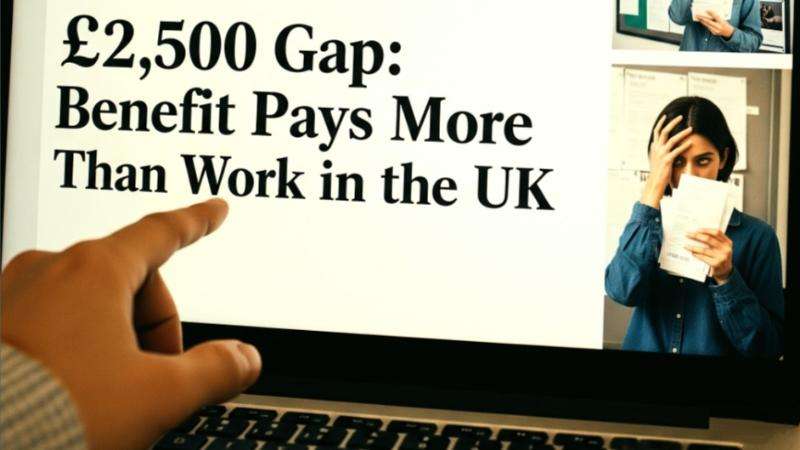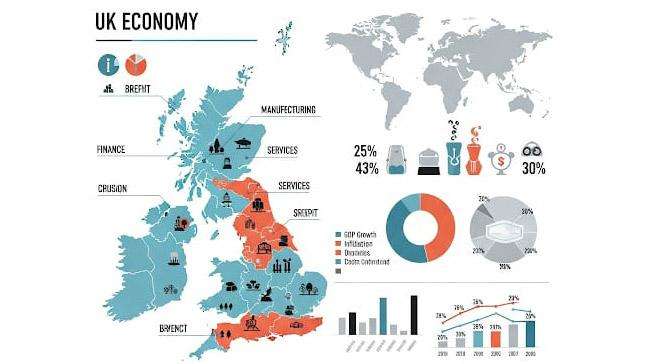New figures reveal that unemployed individuals on sickness benefits could soon receive £2,500 more annually than a full-time minimum wage worker, igniting a fierce debate about welfare dependency and the future of the UK economy.
A startling new report by the Centre for Social Justice (CSJ) think tank has revealed a deepening disparity in the UK's financial landscape: unemployed individuals on sickness benefits are projected to receive £2,500 more per year than a full-time worker on the national living wage by 2026-27. This revelation is intensifying a furious political debate over welfare dependency and the nation's economic stability, following a significant Labour backbench rebellion that scuppered planned cuts to the welfare bill, Daily Dazzling Dawn understands.
According to the CSJ's analysis, a non-working Universal Credit (UC) claimant, receiving the average housing benefit and Personal Independence Payment (PIP) for ill health, is expected to have an annual income of £25,000 in the 2026-27 financial year. In stark contrast, a full-time worker earning the national living wage will take home approximately £22,500 after income tax and National Insurance contributions. This calculation underscores the increasing generosity of the welfare system, particularly after Sir Keir Starmer's Labour government was forced into a humiliating climbdown earlier this month, failing to push through £5 billion of planned welfare cuts due to dissent among his own MPs.
Sir Iain Duncan Smith, the former Work and Pensions Secretary who introduced Universal Credit and is the founder of the CSJ, voiced grave concerns. "Before lockdown, we had the lowest numbers of workless households since records began," he stated. "However, figures from the Centre for Social Justice show how damaging Covid was and that, since then, the scale of the disincentive to work has grown dramatically." He lamented the recent Welfare Bill's failure to enact "real reform of the system," arguing that the "real loss is that of the wasted lives trapped in a system of dependence rather than one of independence and achievement."
The issue is set to dominate the political agenda. Kemi Badenoch, the Conservative Party leader, is poised to issue a stark warning on Thursday, July 10, 2025, that Britain is "sitting on a ticking time bomb" of welfare dependency. She intends to accuse Labour and Reform UK of "turning a blind eye" to a crisis that she believes could "collapse the economy." This comes just days after the Office for Budget Responsibility (OBR) issued its own sobering assessment, warning that the UK’s finances were "increasingly vulnerable" and that Labour’s reversals on winter fuel payments and welfare cuts had created "new downside risks" for the economy.
The Labour government's struggles with its welfare reforms were highlighted by significant rebellions. On Wednesday night, July 9, 2025, 47 Labour MPs voted against the Welfare Bill at its third reading, despite the legislation having already been heavily watered down. This follows an even larger revolt last week, where 49 Labour MPs voted against the Bill at its second reading, marking one of the biggest rebellions during Sir Keir Starmer's time in office, despite his substantial working majority of 165 in the House of Commons. Cat Eccles, the Labour MP for Stourbridge, articulated the sentiment of many rebels, stating, "I didn’t come here to make people worse off and that is why I still cannot support this Bill today."
The figures underpinning these concerns are stark. The Department for Work and Pensions (DWP) expects sickness benefit claims to reach 3.4 million by 2026. This includes significant changes to how Universal Credit and PIP are awarded. From April 2026, new recipients of the health element (Limited Capability for Work and Work-Related Activity, or LCWRA) of Universal Credit will see this amount halved and then frozen, though existing recipients will have their support protected and not frozen from 2026. Additionally, from November 2026, new PIP claimants will need to score a minimum of 4 points from a single daily living descriptor to qualify for the daily living component of PIP, alongside a total of at least 12 points for an enhanced award.
By 2030, Britain's spending on health and disability benefits is projected to hit a staggering £100 billion, an amount equivalent to the income tax contributions of nine million workers. The CSJ's findings also highlighted that a jobless single parent claiming for anxiety and for a child with ADHD could receive almost £37,000 a year – a substantial £14,000 more than a worker on the national minimum wage. Approximately two in three people claiming the health element of UC also receive PIP, and roughly the same proportion receive housing support through UC. While PIP can be claimed while in work, fewer than one in six claimants are employed.
The PIP scheme, designed to help those with long-term conditions and disabled people with daily living and mobility costs, has seen a dramatic increase in uptake since the pandemic. The number of monthly PIP awards has more than doubled, soaring from 13,000 to 34,000 – equating to approximately 1,000 new claims every day. This surge has been largely driven by a sharp increase in claimants citing anxiety and depression as their primary condition, with such awards more than tripling since 2019. Similarly, seven in ten assessments awarding the health element of UC involve mental health and behavioural conditions. The number of children receiving Disability Living Allowance has also doubled over the past decade, primarily due to awards for behavioural disorders, learning difficulties, or ADHD.
In response to these trends, the CSJ has called on the Government to withdraw PIP and UC from those with milder anxiety, depression, or ADHD, projecting potential savings of £7.4 billion a year by 2029-30. The think tank suggests that £1 billion of these savings should be redirected towards reinvestment in frontline mental health services, including NHS talking therapies and support groups.
Joe Shalam, the policy director at the CSJ, acknowledged the efforts of Liz Kendall, the Work and Pensions Secretary, in "tackling the perverse incentives that have crept into the welfare system since Covid." He added, "People who cannot work due to sickness or disability must always be protected, but as our research shows, too many people are trapped in a cycle of dependency and wasted potential." Shalam urged ministers to "tighten eligibility for mental health benefits and invest in therapy and employment support," advocating for the expedited "Timms review" into the welfare system, which Labour Minister for Social Security and Disability, Sir Stephen Timms, has been tasked with leading. The Government has made concessions to the Welfare Bill, ensuring that a taskforce examining PIP has a majority of disabled members and that its conclusions are subject to a binding Commons vote. Sir Stephen Timms has also confirmed that the basic Universal Credit standard allowance will rise at least in line with inflation until 2029/30.
The Liberal Democrats also faced internal strife over the Bill, with Christine Jardine being sacked from their front bench for voting against the reforms, despite the party having whipped its MPs to abstain. A Liberal Democrat source defended the decision, accusing Ms. Jardine of "virtue signalling" and emphasizing the need for frontbench unity.
A government spokesman reiterated their commitment to welfare reform: "We inherited a broken social security system that is failing people on all accounts. We are changing the system so it genuinely supports those who can work into employment and ensuring the safety net will always be there for the most vulnerable – and puts the spiralling welfare bill on a more sustainable footing." The ongoing debate highlights the complex challenge of balancing support for the vulnerable with the imperative of fostering employment and economic sustainability.








.svg)


